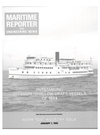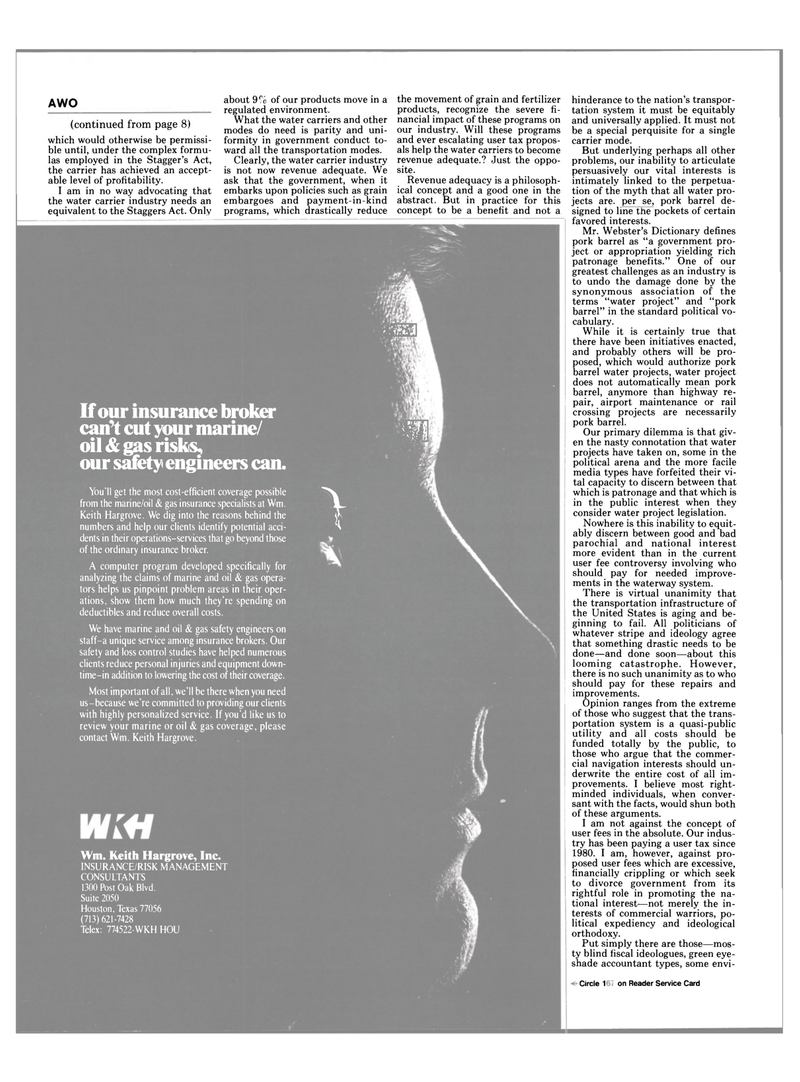
Page 8: of Maritime Reporter Magazine (January 1985)
Read this page in Pdf, Flash or Html5 edition of January 1985 Maritime Reporter Magazine
AWO (continued from page 8) which would otherwise be permissi- ble until, under the complex formu- las employed in the Stagger's Act, the carrier has achieved an accept- able level of profitability.
I am in no way advocating that the water carrier industry needs an equivalent to the Staggers Act. Only about 9% of our products move in a regulated environment.
What the water carriers and other modes do need is parity and uni- formity in government conduct to- ward all the transportation modes.
Clearly, the water carrier industry is not now revenue adequate. We ask that the government, when it embarks upon policies such as grain embargoes and payment-in-kind programs, which drastically reduce the movement of grain and fertilizer products, recognize the severe fi- nancial impact of these programs on our industry. Will these programs and ever escalating user tax propos- als help the water carriers to become revenue adequate.? Just the oppo- site.
Revenue adequacy is a philosoph- ical concept and a good one in the abstract. But in practice for this concept to be a benefit and not a
If our insurance broker can't cut your marine/ oil & gas risks, our safety engineers can.
You'll get the most cost-efficient coverage possible from the marine/oil & gas insurance specialists at Wm.
Keith Hargrove. We dig into the reasons behind the numbers and help our clients identify potential acci- dents in their operations-services that go beyond those of the ordinary insurance broker.
A computer program developed specifically for analyzing the claims of marine and oil & gas opera- tors helps us pinpoint problem areas in their oper- ations, show them how much they're spending on deductibles and reduce overall costs.
We have marine and oil & gas safety engineers on staff-a unique service among insurance brokers. Our safety and loss control studies have helped numerous clients reduce personal injuries and equipment down- time-in addition to lowering the cost of their coverage.
Most important of all, we'll be there when you need us-because we're committed to providing our clients with highly personalized service. If you'd like us to review your marine or oil & gas coverage, please contact Wm. Keith Hargrove.
Wm. Keith Hargrove, Inc.
INSURANCE/RISK MANAGEMENT
CONSULTANTS 1300 Post Oak Blvd.
Suite 2050
Houston, Texas 77056 (713) 621-7428
Telex: 774522-WKH HOU -Ml m > hinderance to the nation's transpor- tation system it must be equitably and universally applied. It must not be a special perquisite for a single carrier mode.
But underlying perhaps all other problems, our inability to articulate persuasively our vital interests is intimately linked to the perpetua- tion of the myth that all water pro- jects are. per se, pork barrel de- signed to line the pockets of certain favored interests.
Mr. Webster's Dictionary defines pork barrel as "a government pro- ject or appropriation yielding rich patronage benefits." One of our greatest challenges as an industry is to undo the damage done by the synonymous association of the terms "water project" and "pork barrel" in the standard political vo- cabulary.
While it is certainly true that there have been initiatives enacted, and probably others will be pro- posed, which would authorize pork barrel water projects, water project does not automatically mean pork barrel, anymore than highway re- pair, airport maintenance or rail crossing projects are necessarily pork barrel.
Our primary dilemma is that giv- en the nasty connotation that water projects have taken on, some in the political arena and the more facile media types have forfeited their vi- tal capacity to discern between that which is patronage and that which is in the public interest when they consider water project legislation.
Nowhere is this inability to equit- ably discern between good and bad parochial and national interest more evident than in the current user fee controversy involving who should pay for needed improve- ments in the waterway system.
There is virtual unanimity that the transportation infrastructure of the United States is aging and be- ginning to fail. All politicians of whatever stripe and ideology agree that something drastic needs to be done—and done soon—about this looming catastrophe. However, there is no such unanimity as to who should pay for these repairs and improvements.
Opinion ranges from the extreme of those who suggest that the trans- portation system is a quasi-public utility and all costs should be funded totally by the public, to those who argue that the commer- cial navigation interests should un- derwrite the entire cost of all im- provements. I believe most right- minded individuals, when conver- sant with the facts, would shun both of these arguments.
I am not against the concept of user fees in the absolute. Our indus- try has been paying a user tax since 1980. I am, however, against pro- posed user fees which are excessive, financially crippling or which seek to divorce government from its rightful role in promoting the na- tional interest—not merely the in- terests of commercial warriors, po- litical expediency and ideological orthodoxy.
Put simply there are those—mos- ty blind fiscal ideologues, green eye- shade accountant types, some envi-
Circle 313 on Reader Service Card

 7
7

 9
9
